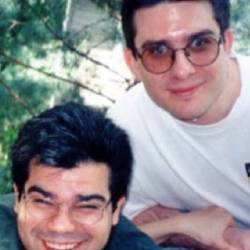 Sam and Ivan talk about:
Sam and Ivan talk about:
- Goodbye Sarah Palin
- Jupiter Gets Smashed
- Alternate Money
- Honduras Again
- New Diabetes Treatment
- US International Rep
- Henry Louis Gates
Note: For those using the “View in iTunes” link, it often takes iTunes quite a few hours to show a new episode after the episode is posted here. So if you are looking for the podcast very soon after I post this, use one of the other methods to find the new episode. For those who are subscribed, your Podcast software should pick up the new episode next time it checks for new episodes on its own, or you can always force a refresh. For those using the XML feed directly, the new episode is now there.
Regarding Gates, it doesn’t matter what various state laws say, because the Fourth Amendment will trump any such law, especially under the circumstances here.
What we know now – and I don’t know when you and Ivan recorded the show – is that the call was very unclear about a burglary being in progress. Therefore, there was no probable cause to enter under the exigency exception.
Even without probable cause, police can demand that a person identify himself – not produce an identification card, much less an officer-specified identification card. Identification is a name.
The thing is, according to Crowley’s police report, he had already assessed that there was no crime under way, and yet he still demanded identification. Meanwhile, Crowley had no authority to detain Gates – in his home, no less – while awaiting the production of identification.
So, the big questions are:
1) Did Gates invite Crowley in? Neither police report has stated Crowley’s authority to enter. In the absence of consent or an exigency exception to the warrant requirement, Crowley had no authority.
2) Once Crowley determined that there was unlikely a crime in progress (i.e., no reasonable suspicion and definitely no probable cause), why didn’t he simply leave?
3) Once Crowley was inside and had decided there was no crime being committed, why did he exceed his constitutional authority and continue to demand identification?
4) Once Gates produced his Harvard ID, why did Crowley exceed his constitutional authority and demand a driver’s license?
5) Once Crowley had already repeatedly exceeded his constitutional authority, why did he then turn vindictive and, acting contrary to well established Massachusetts law, arrested Gates for disorderly conduct, for conduct that clearly did not meet the Massachusetts standard?
At first, I was with the group decrying Obama’s “acted stupidly” remark. As the facts started trickling out, it became very clear that the Cambridge Police did, in fact, act stupidly.
We recorded the show at about 2 UTC on Monday. A bunch has come out since then. I think it is now clear that the officer pushed in places where the wise (and perhaps legally correct) thing would have just been to step back and go away. It also seems clear, that even if he was 100% in the right legally, Gates acted in a way that was not conducive to resolving the situation calmly and without incident.
So, the officer most likely exceeded his authority and made things worse. Gates probably acted completely within his rights, but still in a manner that was unwise and could easily have been predicted to lead to trouble.
So, they were both “acting stupidly”. However Gates was acting stupid in a legal way as a civilian in his own home, and Crowley was acting stupid in a way that exceeded his constitutional authority while on duty. So, on balance this probably goes to Gates being on the right side of the argument.
But that doesn’t mean Gates wasn’t stupid too.
From Facebook:
GH: Really Long Effin Show
2 hours ago
From Facebook:
SM: Yeah, but we’ve had longer. And the poem was almost 15 minutes long. Or at least it seemed that way. Take the poem out, and we would have been an average, or possibly even below average Curmudgeon’s Corner length.
Of course, in either case, I highly recommend listening to the podcast at double speed on the iPhone or other player that allows for that. It is much better sped up to twice the speed. :-)
2 seconds ago
I’m a little bit split on what I think if Gates’ conduct.
Yes, he could have prevented the whole thing if he hadn’t been such a jackass.
However, I’m not sure how polite I’d be to an officer who entered my home illegally.
Ivan said something like that on the show. I think the answer is that of course it is perfectly natural to be upset under such situations, but never-the-less it is almost always unwise to become belligerent, and keeping ones cool is much more likely to result in a positive outcome for all involved.
Of course, in Gates’ case, the events that have transpired may present an even better outcome. Many people who have likely never heard of him before now have, which means his work is exposed to people who may not have been familiar with him before.
He’s also now been publicly declared a friend of the President, and that adds to his credibility.
Finally, he appears to have reached an amicable solution, giving the appearance that, rather than being a jackass, he is, in fact, quite reasonable.
I’d say he benefited more from the actual outcome than the “better” outcome.
Unfortunately, I think you are most likely correct.